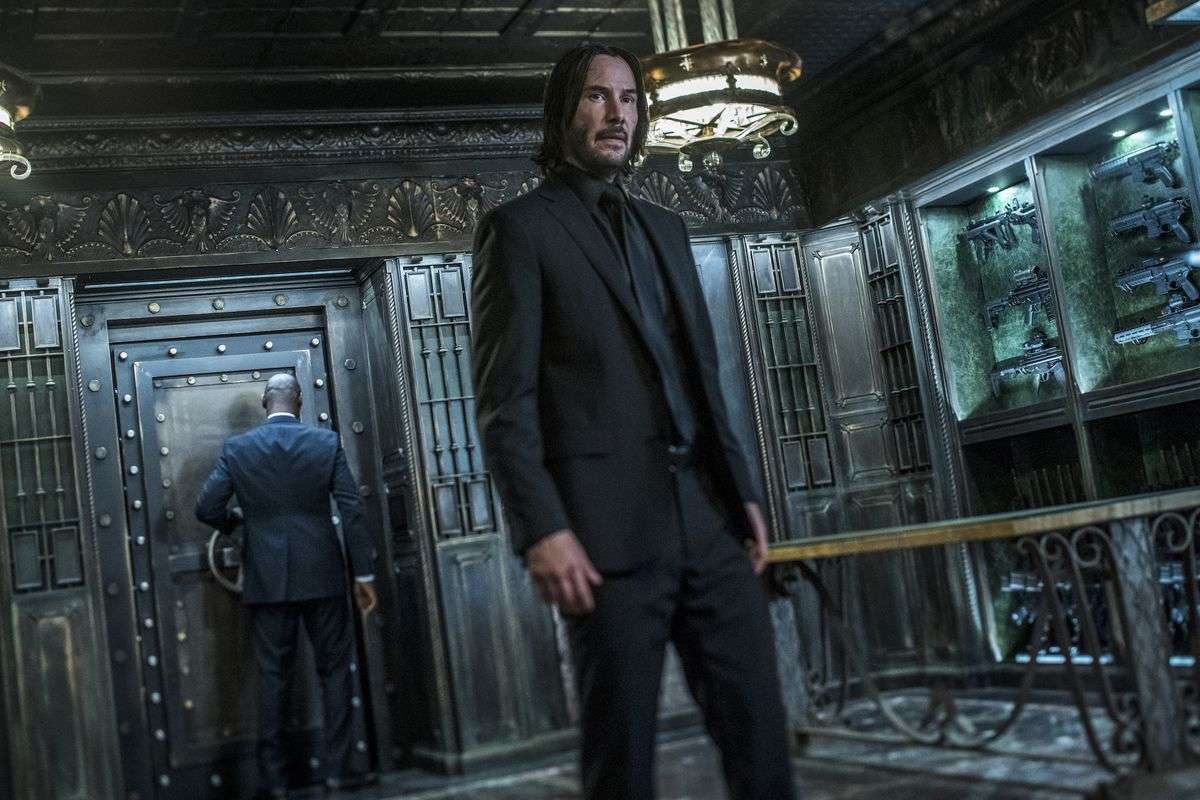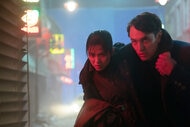Create a free profile to get unlimited access to exclusive videos, sweepstakes, and more!
OK, but how do the fancy gold coins in 'John Wick' work? Unpacking the High Table's dark economy
The gritty world of John Wick is so complex, it even has its own economy.

The John Wick franchise is a hit with audiences in large part due to its "back to basics" approach to action films: Just show genre fans cool ways to punch and shoot bad guys and repeat. However, there's nothing basic about the intricate world building that underpins all the fights and shootouts. The gritty world of John Wick is so complex, it even has its own economy — one that runs on gold coins that are often worth more than actual gold among this secret society of gun-toting, black-suited, tattooed assassins.
As we gear up for John Wick: Chapter 4 hitting theaters next month, and with the first three films in the franchise available to stream on Peacock, here's a deep-ish dive into how the currency of John Wick's criminal underbelly works — and what's up with all those gold coins.
RELATED: Keanu's best action movies, ranked from 'The Matrix' to 'John Wick'
No, seriously: What's up with those gold coins? In 2014's John Wick, what audiences thought was just Keanu Reeves' version of Death Wish — centered on a mysterious assassin with a skillset that would make Taken's Liam Neeson blush — turned out to be an action movie with its own mythos when those coins show up. John Wick and its sequels peel back the curtain on that mythology, revealing that this shadowy world of crime syndicates and well-armed enforcers is an international agency that uses these coins as both fiscal and ethical currency within their profession. Everyone from contract killers to hotel concierges to doctors — even the poor (but scary-looking) guys in charge of disposing of bodies — are seemingly only paid with these special coins instead of real money.
The gold coins in this culture allow these mercs and others to acquire goods and services. You want a hotel room for the night to escape the trigger-happy, vaguely European murderers on your tail? That'll be one gold coin, please. Looking to upgrade your arsenal with a grenade launcher or six? *Places elaborately decorated gold coin here.*
More importantly, these coins exceed the value of the physical items they buy, for they act as a toll one pays to travel through and amongst this secret society with their honor and safety intact. The act of paying with these coins provides a sense of security as even killers have a "code of conduct" ... and those in John Wick's line of work are mostly strict adherents of it.
This adherence stems from the fact that (as we learn in John Wick: Chapter 2) the hotel network John and his fellow assassins use, The Continental, is the main banking hub for Wickbucks. Killing of any kind on Continental grounds is verboten and punishable by death and/or being "excommunicado" from all services and protections afforded this underworld of gun-fu enthusiasts.
The Continental hotel network is also equal parts an ATM and customs for assassins passing through and in between assignments. It's responsible for keeping the coins (and those that spend them) in circulation. And who is responsible for the Continental and the governing of this world? They are known as the High Table, which the filmmakers have described as a governing body that is older and bigger than any other in history, which explains why it operates above the law and under no jurisdiction but its own. The High Table seems to have set the one-to-one transaction rules for coinage, as everything in the Continental costs one single coin.
From a drink at the bar to requesting a doctor to patch up your wounds, it can be all yours for the price of the gold in your tailored pockets. But why does a variety of goods and services cost the same amount? How is that at the benefit of this mysterious cabal?
Again, the operatives and personnel are paying for the privilege of a code of conduct they cannot get anywhere else. This practice is priceless and worth more than any monetary amount, but the value is signified in the transaction of gold coins. Real money — digital or otherwise — has no real meaning or value to this subculture other than it gives oxygen to the very dangers the organization has spent centuries insulating itself from.
With stacks of cash comes the risk and invitation of vice. (Which, when your clientele is mostly made up of lethal and dangerous for-hire assassins, one can't be too careful with their secret society bylaws.) As cliche as the saying "honor among thieves" is, those under the High Table's purview take it literally.
That's why this economy full of deadly contract killers and mercenaries, who communicate their contracts via an old-timey network of switchboard operators, relies on their special coins. Because they offer that which silver briefcases full of dough cannot: trust, honor, and loyalty. The coin, and the persons on either side of its transaction, communicate that you and all you represent are in good hands. That whatever safety and integrity one seeks from the High Table as an institution will be found — as long as one honors the whole "no killing where you eat" company policy.
With that philosophy in mind, the rules of John Wick's culture become more clear. Why does a gun cost as much as a drink? Or a favor? Because in this world, those things are only worth what the purchaser brings to the table. And what they bring is all they are, symbolized in the form of a coin.
But there are still some fuzzier aspects to High Table Economics 101. For example: The value of the contract that is placed on John Wick's head is in U.S. dollars. This strongly implies that our world's currency has some weight in this one. Perhaps gold coins can be exchanged for real, folding money? (We don't even want to try and figure out the exchange rate there.) We know from John's time in civilian life that he and his late wife bought gas and groceries. (We see John do the former in his first film.) Surely he and his peers have access to American money, because good luck trying to pay for Double Stuf OREOs at Safeway with gold murder tokens!
Coins can also signify collateral for more intangible things, like when someone asks for a service or a favor. When John seeks medical care from a doctor in John Wick: Chapter 3 - Parabellum, with only an hour on the clock before he is officially excommunicado, he does so by offering the doc a coin. In this instance, the coin is used like some kind of chit or blood marker. The doctor is unable, or unwilling, to break his code by refusing to accept the coin John implores upon him. So even when you are at risk of expulsion, the High Table's honor code extends until your final second is up.
As dangerous as John Wick's shadowy world is, its population of expertly trained marksmen and killers ensure it and their survival by honoring its code of conduct. One gold coin at a time.
John Wick: Chapter 4 arrives in theaters on March 24.
Can't wait until then? Catch up on the first three movies in the John Wick franchise, all streaming on Peacock.


























